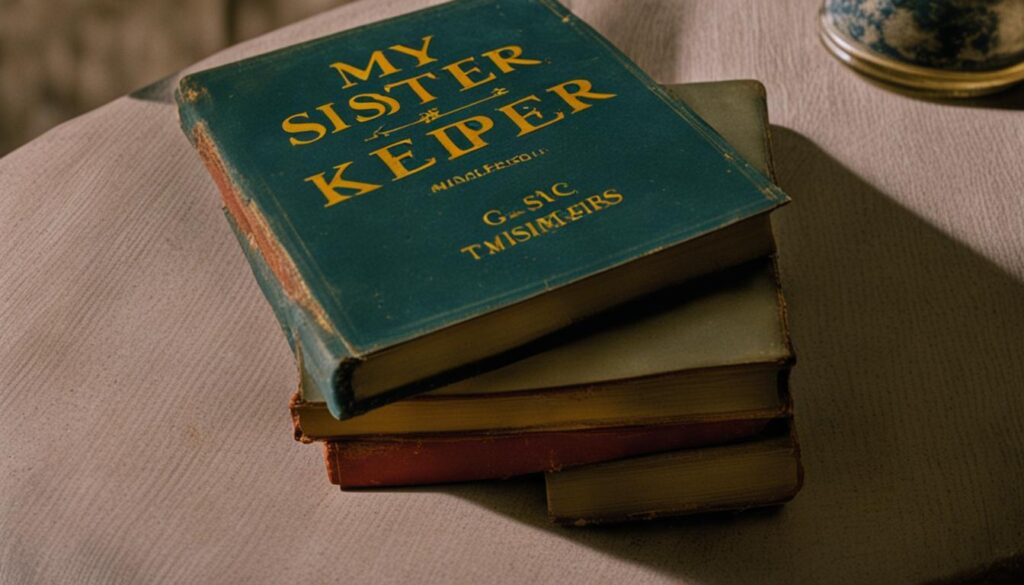When it comes to impactful and emotional storytelling, few authors can match the power of Jodi Picoult. Her novel “My Sister’s Keeper” is a testament to her skill as a writer, filled with compelling characters, thought-provoking themes, and a story that will stay with you long after the final chapter.
If you’re considering experiencing this novel in audiobook format, our comprehensive review will provide you with all the information you need to decide if it’s the right choice for you.
Key Takeaways
- Jodi Picoult’s “My Sister’s Keeper” is a moving and thought-provoking novel that explores themes of family, love, and ethical dilemmas.
- Our audiobook review will provide you with a comprehensive evaluation of the audiobook format, narration, plot, and themes explored in the novel.
- Whether you’re a fan of Jodi Picoult or looking for a new audiobook to add to your collection, our review will help you decide if “My Sister’s Keeper” is the right choice for you.
- The novel’s enduring legacy and impact on readers is a testament to its powerful storytelling and emotional depth.
- Overall, “My Sister’s Keeper” is an audiobook that is well worth experiencing for anyone who enjoys thought-provoking and emotionally impactful storytelling.
Overview of “My Sister’s Keeper”
Jodi Picoult’s novel, “My Sister’s Keeper,” is a gripping tale that centers around the Fitzgerald family as they navigate the complexities of love, life, and loss. At its core, the book examines the bonds of family and the lengths that we will go to protect those we love.
The story follows Anna Fitzgerald, a young girl who was conceived to be a genetic match for her older sister, Kate, who suffers from leukemia. Over the years, Anna is repeatedly called upon to donate blood, platelets, and even a kidney to her sister in an attempt to save her life. As Anna matures and begins to comprehend the true extent of her sister’s illness and her role in Kate’s treatment, she becomes determined to win the rights to her own body and make her own medical decisions.
The novel explores themes of family, morality, and medical ethics in a poignant and thought-provoking manner, and the emotional complexity of the characters draws readers in and leaves a lasting impression. With over 11 million copies sold worldwide, “My Sister’s Keeper” is a beloved classic that continues to resonate with readers today.
Audiobook Format and Narration
One of the essential elements that contribute to the overall listening experience of an audiobook is the quality of its production. “My Sister’s Keeper” audiobook is presented unabridged, and its chapters are carefully structured and divided, making it easy for the listener to follow along.
The narration by the talented voice artist and stage actress, Suzanne Toren, is one of the highlights of the audiobook. Toren brings the characters to life with her distinct voice and immersive performance, enhancing the emotional depth of the novel and delivering a compelling listening experience to the audience. Her voice expertly captures the tension, heartache and love present in the story, making it more engaging and thought-provoking for the listener.
Aside from the exceptional narration, other production aspects such as sound quality and volume consistency are also noteworthy. The audio is clear and of excellent quality, and the volume remains consistent throughout the recording. These factors are important as they provide a seamless listening experience, without the need for frequent adjustments or disruptions.
Plot Analysis and Character Development
Jodi Picoult’s storytelling shines in “My Sister’s Keeper,” packed with intricate plotlines and dynamic characters. The novel explores the moral and ethical dilemmas of Anna Fitzgerald, a young girl whose parents conceived her to serve as a compatible donor for her sister, Kate, who has leukemia.
Picoult uses a non-linear narrative structure to delve into each character’s perspective, allowing readers to fully understand their motivations and decisions. Each chapter is narrated by a different character, including Anna, her mother Sara, her father Brian, and even her attorney, Campbell Alexander.
The plot thickens as Anna hires Campbell to sue her parents for medical emancipation, a decision that puts a strain on the Fitzgerald family and forces them to confront their deepest fears and secrets.
The character development in “My Sister’s Keeper” is exceptional, with each character undergoing significant transformation throughout the novel. Anna, who has always been the obedient one, finally stands up for herself while Sara begins to question the morality of using one child to save another.
The novel’s surprising ending leaves readers questioning their own moral beliefs and highlights Picoult’s ability to create complex narratives that leave a lasting impact.
“My Sister’s Keeper is a beautiful, heartbreaking, controversial, and honest work of art.” – Jodi Picoult
Emotion and Themes Explored
“My Sister’s Keeper” by Jodi Picoult is a novel that delves deep into complex themes and emotions. The ethical and moral dilemmas faced by the characters in the novel are thought-provoking and raise questions about family relationships, medical decision-making, and mortality. The emotional impact of the novel is palpable, as it explores the struggles and complications of family life.
In “My Sister’s Keeper,” the main theme of the novel is the bond between sisters and the lengths that one would go to in order to protect their sibling. The novel raises questions about the ethics of using a child as a donor for another family member and the impact it has on the family dynamics.
Jodi Picoult’s storytelling prowess highlights the various emotions experienced by the characters, including grief, loss, love, resentment, and sacrifice. The characters are multidimensional and relatable, adding depth to the themes explored in the novel.
The novel also delves into the ethical issues surrounding medical decision-making, which presents the readers with the difficult question of who has the right to decide the fate of a sick child. The moral dilemma and the heart-wrenching plot twists leave an emotional impact on the reader, prompting them to question their own ethical principles.
Writing Style and Literary Techniques
Jodi Picoult’s writing style is characterized by its precision, vivid imagery, and emotional depth. She employs a range of literary techniques to engage readers, including metaphors, similes, and foreshadowing. Through these techniques, Picoult creates a world that is both relatable and compelling, drawing the reader into the story and immersing them in the lives of her characters.
One of the key strengths of Picoult’s writing is her ability to foster empathy in her readers. She accomplishes this by using alternating perspectives to reveal the inner worlds of her characters. By providing insight into the thoughts and feelings of each character, Picoult creates a rich and complex narrative that explores the nuances of human relationships and emotions.
Furthermore, Picoult employs frequent use of flashback to provide deeper insights into her characters, providing the reader with a more holistic picture. This narrative structure also adds to the suspense of the novel, keeping readers engaged and invested in the story.
“You don’t love someone because they’re perfect, you love them in spite of the fact that they’re not.” – Jodi Picoult, My Sister’s Keeper
Overall, Jodi Picoult’s writing style and use of literary techniques in “My Sister’s Keeper” create a powerful and emotionally resonant story that leaves a lasting impact on the reader.
Critical Reception and Controversies
Since its publication in 2004, “My Sister’s Keeper” has garnered mixed reviews from critics and readers alike. While some have praised Jodi Picoult’s emotionally charged narrative and thought-provoking exploration of family relationships and medical ethics, others have criticized the novel’s predictable plot and heavy-handed approach.
“A triumph…a stunning piece of work.” – Boston Herald
Despite the controversy that surrounded the novel’s ending, “My Sister’s Keeper” became a New York Times bestseller and has since been translated into more than 30 languages. Some readers have found the ending to be poignant and fitting, while others have found it unsatisfying and contrived.
“It may surprise those who doubted that Picoult could outdo herself after her last issue-laden best seller, ‘Nineteen Minutes.’ Her themes of family, loss, and redemption pack a powerful emotional wallop.” – Library Journal
The controversy over “My Sister’s Keeper” intensified with the release of the 2009 film adaptation, which made significant changes to the novel’s ending. While some fans of the novel appreciated the film’s new direction, others were disappointed with the changes and felt they undercut the book’s central themes.

Comparisons to the Film Adaptation
After experiencing the audiobook version of “My Sister’s Keeper,” many listeners may wonder how it compares to the film adaptation of the novel. In this section, we will provide a detailed book-to-movie comparison, analyzing both the similarities and differences between the two formats.
Similarities
Overall, the film adaptation of “My Sister’s Keeper” stays faithful to the novel’s central themes and characters. The casting choices are effective, particularly Cameron Diaz’s portrayal of the mother, and the emotional depth of the story is captured in both mediums. Additionally, both the audiobook and the film explore the complex medical ethics surrounding the use of a child as a donor for a sibling.
Differences
Despite the similarities, there are significant differences between the audiobook and the film adaptation. One notable change is the ending, which is altered in the film, deviating from the original source material. Additionally, the film adaptation places a greater emphasis on the romantic subplot between Kate and Taylor, a relationship that is only hinted at in the novel.
“While the film adaptation captures the emotional impact of ‘My Sister’s Keeper,’ it adds and omits elements that may not sit well with those who adored the novel.”
Audiobook vs. Film: Which is Better?
While both the audiobook and the film adaptation have their noteworthy aspects, the effectiveness of each ultimately varies based on what the listener or viewer is seeking. The audiobook provides a more comprehensive understanding of the narrative, exploring each character’s perspective and the depth of their emotions. The film adaptation, on the other hand, offers a visually engaging and emotionally impactful interpretation of the novel, bringing the story to life on screen.
Image:
Impact and Enduring Legacy
Since its publication in 2004, “My Sister’s Keeper” by Jodi Picoult has left a significant impact on readers worldwide, exploring complex themes around family, medical ethics, and morality. The novel’s enduring legacy is a testament to its powerful storytelling and emotional depth, resonating with readers long after its initial release.
As the tenth novel by bestselling author Jodi Picoult, “My Sister’s Keeper” has become a beloved classic in contemporary literature, recognized for its thought-provoking narrative and complex characters. The novel’s success has not only launched the career of one of the most influential authors of our time but has also paved the way for a new generation of storytellers to explore challenging, controversial, and nuanced subjects.
Beyond the written word, “My Sister’s Keeper” has also had significant cultural impact, inspiring a Hollywood film adaptation in 2009. Although the movie received mixed reviews, the novel’s legacy continues to captivate new readers and influence contemporary culture.

Jodi Picoult’s work has remained relevant and impactful over the years, resonating with readers across generations. The enduring legacy of “My Sister’s Keeper” stands as a testament to the transformative power of storytelling, inspiring readers to explore complex emotions, navigate challenging moral dilemmas, and confront difficult truths.
Recommendations and Final Thoughts
If you’re a fan of audiobooks and enjoy emotionally-charged novels with thought-provoking themes, we highly recommend giving “My Sister’s Keeper” a listen. The audiobook format brings a new level of intimacy to Jodi Picoult’s already engaging storytelling, allowing listeners to fully immerse themselves in the character’s intricate lives and complex relationships.
| Pros | Cons |
|---|---|
|
|
“My Sister’s Keeper” is a moving and thought-provoking novel that explores the complexities of family, relationships, and ethics. Jodi Picoult’s emotionally charged writing style paired with the strong narration in the audiobook format make for an unforgettable listening experience.
Overall, “My Sister’s Keeper” is a must-listen for fans of Jodi Picoult’s work or anyone looking for a powerful and thought-provoking audiobook experience. The novel’s themes and characters will linger with you long after you’ve finished listening, leaving a lasting impact on your perspective of life and love.
Conclusion
In conclusion, “My Sister’s Keeper” by Jodi Picoult is a novel that explores complex ethical dilemmas, family dynamics, and the human condition with heart-wrenching detail. The audiobook version provides a listening experience that immerses the audience in the story’s emotional depth, thanks in part to the talented narrator.
The compelling plot and well-developed characters showcase Jodi Picoult’s impressive storytelling abilities, while the underlying themes of medical ethics, love, and sacrifice push the audience to question their own values and beliefs. The critical reception of the novel has been mixed, with some praising the emotional impact and thought-provoking themes and others critiquing its execution.
Overall, we highly recommend the audiobook version of “My Sister’s Keeper” to those who enjoy emotionally charged stories that challenge their perspectives. Whether you choose to experience it through the audiobook or other mediums, “My Sister’s Keeper” is a novel that will leave a lasting impression on readers and continue to hold relevance in the literary world for years to come.



